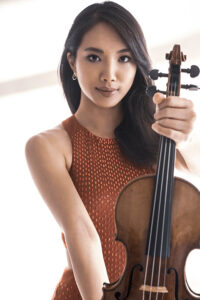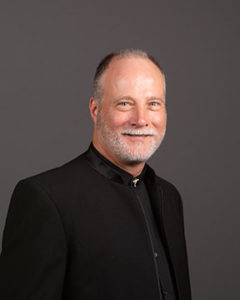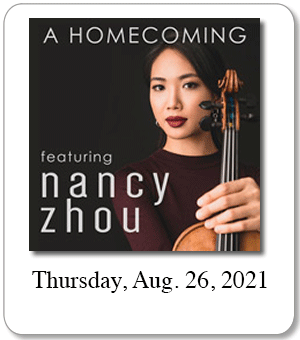PROGRAM
William Grant Still – Poem for Orchestra
Franz Schubert – Symphony No. 8 in B Minor, “Unfinished”
Samuel Barber – Violin Concerto, Op. 14
– Nancy Zhou, violin solo
William Grant Still: Poem for Orchestra
William Grant Still, Jr, (1895-1978) was born in Mississippi and reared in Little Rock. His father, who died in Still’s infancy, was a musician, and as a boy he was exposed to a wide array of musical forms, from spirituals to operettas and classical recordings. He studied at Wilberforce University and Oberlin School of Music and became adept at a variety of instruments.
Work took Still to New York City, where he performed with leading jazz bands and orchestras, composed and arranged music. In the 1930s, he developed a close relationship with Eastman School of Music head Howard Hanson. In 1931, Hanson conducted Still’s Symphony #1 (Afro-American Symphony), the first major classical work by an African American composer to be performed by a major orchestra. It continued to be the most popular American symphony up to 1950. His Poem for Orchestra (1944) has been described as portraying the search for spiritual enlightenment in difficult times, surely a reflection of both his experience as a black artist and the context of World War II.
Still composed five symphonies and nine operas in his lifetime. He arranged music for films. In addition, he was an articulate spokesman for the rights of black Americans. Willian Grant Still demonstrated emphatically that black Americans, who have contributed so greatly to musical idioms such as the blues and jazz, are also contributors to the traditions of classical music.
Schubert: Symphony No. 8 “Unfinished”
Who has gifted us with more melodic sound, particularly one who lived scarcely three decades, than has Franz Schubert (1797-1828)? The young Viennese showed early aptitude for music, demonstrating skill at both piano and violin, being accepted by the presiding musical authority of the city, Antonio Salieri, as a composition student. But Schubert’s musical gifts and inclination were restricted by his schoolmaster father’s determination that he train as a teacher in the family school.
The difficulty of earning a living as a composer plagued young Schubert. But by 1820, his accomplishments were well known in Viennese musical circles. Indeed, “Schubertiads” were held by such admirers to feature his music. And Schubert was a prolific composer of symphonies, piano sonatas and impromptus, chamber music, masses and lieder, among other forms. Though he became widely appreciated only after his death, knowledgeable music lovers in Vienna, including Beethoven, appreciated Schubert’s genius. He died at 31.
Schubert was much loved by the Romantic composers who followed him. Liszt is said to have called him “the most poetic” composer. Certainly, one feels that poetry in the “Unfinished Symphony.” Why was it unfinished? Schubert left two movements and sketches of a third. Did he go on to other work? Did he decide what he had composed could stand on its own? We will never know. But in our 20th season, as in our first, we are pleased to present this melodic gem to you.
Samuel Barber: Violin Concerto
Nancy Zhou, violin soloist
Samuel Barber (1910-1981) was one of the outstanding American composers of the 20th century. Like many before him, Barber, from a comfortable and musically inclined family, demonstrated his musical talents early. At age nine, he wrote his mother earnestly, “I am meant to become a composer.” Indeed, he was. Trained at the Curtis Institute, he excelled in composition, piano and voice. There he also met his longtime friend and partner Gian Carlo Menotti.
Though not all his compositions were applauded, even by himself, Barber was exceptionally successful in having his work recorded. And the Adagio for Strings, drawn from his string quartet, stands as one of the most consistently respected and loved orchestral works of the century. Among his compositions, Barber wrote one concerto for violin, one for piano, one for cello and one for flute, oboe and trumpet. His violin concerto, composed in 1939, offers deeply Romantic sounds in musical language of the 20th century. Solo instrument and orchestra seem particularly adapted to one another in the work.
Experienced Symphony of the Hills patrons know our featured soloist Nancy Zhou from the past, in solo or duet performances from 2003 (at age 10!), 2005 and 2007. The daughter of Long Zhou, our concertmaster for many years, she showed a genius with the violin early. The pupil of her father, she went on to study at the New England Conservatory and take her degree from Harvard University. Zhou has won numerous prizes, including First Prize at the 2018 Shanghai Isaac Stern International Violin Competition. What a pleasure to have her return to the Symphony in its 20th season!

Lauded as one of today’s probing musical voices, violinist Nancy Zhou is rapidly building an international profile after winning the 2018 Shanghai Isaac Stern Violin Competition. With a robust online presence that seeks to invigorate appreciation for the art and science of the violin, her thoughtful musicianship resonates with a global audience in such a way that brings her on stage with leading orchestras around the world.
Making her orchestral debut at the age of 13 with her hometown orchestra, the San Antonio Symphony, Nancy went on to collaborate with the Royal Stockholm Philharmonic Orchestra, Finnish Radio Symphony, St. Petersburg Philharmonic, Shanghai Symphony Orchestra, China National Symphony, Kansas City Symphony, San Diego Symphony, Padua Chamber Orchestra, among others.
Upcoming engagements include performances with the China Philharmonic, Hangzhou Symphony, Sichuan Symphony, National Taiwan Symphony Orchestra, Orchestra of Perugia, and the IRIS Orchestra in Tennessee. She has collaborated with conductors such as Jaap van Zweden, Sakari Oramo, Hanny Lintu, Eun Sun Kim, Peter Oundjian, Christoph Poppen, Jean-Jacques Kantorow, Gilbert Varga, Michael Stern, Darrell Ang, Jurjen Hempel, Muhai Tang, Sebastian Lang-Lessing, and Ken-David Masur.
Alongside undertaking projects as a soloist, Nancy holds interest in chamber music and in providing guidance to young musicians. As a collaborator, she has performed at the Verbier Festival, Ravinia Festival, Tongyeong Music Festival, Festpiele Mecklenburg- Vorpormmern, Festival de Coimbra, and the Marvão Festival, with upcoming performances at the Paganini Genova Festival. In 2017, she was invited by the Encore Chamber Music Festival to serve as guest artist and faculty member. She is a regular guest educator in Taiwan, holding masterclasses at various institutions and conducting private classes. Since the spring of 2020, Nancy devotes time to a private online studio, teaching a number of students across the globe and presenting public group classes on fundamental training and cultivating mindful awareness.
Born in Texas to Chinese immigrant parents, Nancy began the violin at age four under the guidance of her father. She went on to study with Miriam Fried at the New England Conservatory while pursuing her interest in literature and subsequently earning a Bachelor’s of Arts at Harvard College. An Associated Artist of the Queen Elisabeth Chapel, where she studied with Augustin Dumay, Nancy has also received generous support by Anne-Sophie Mutter.
Nancy plays on a Joseph Guarneri violin from 1730-33 known as the “Le Sphynx”, on generously loan to her from a private sponsor.
 From The Conductor:
From The Conductor:
The concert will open with the profoundly powerful work, “Poem for Orchestra” by Black American composer William Grant Still. Still’s wife, Verna Arvey, wrote the poem that inspired the work. She said the poem was “inspired by the concept of a world being reborn spiritually after a period of darkness and desolation.” Our current world situation seems to require our attention to a composer like Still and to seek common ground during these challenging times. Next on the program is Schubert’s magnificent “Unfinished Symphony”, which was also performed during the symphony’s first season 20 years ago. Our grand finale brings home one of the stars of today’s violin world, Ms. Nancy Zhou, a multi-award-winning concert violinist. During her early years, Nancy performed solos and played with the Symphony of the Hills,

 Concert III
Concert III 


